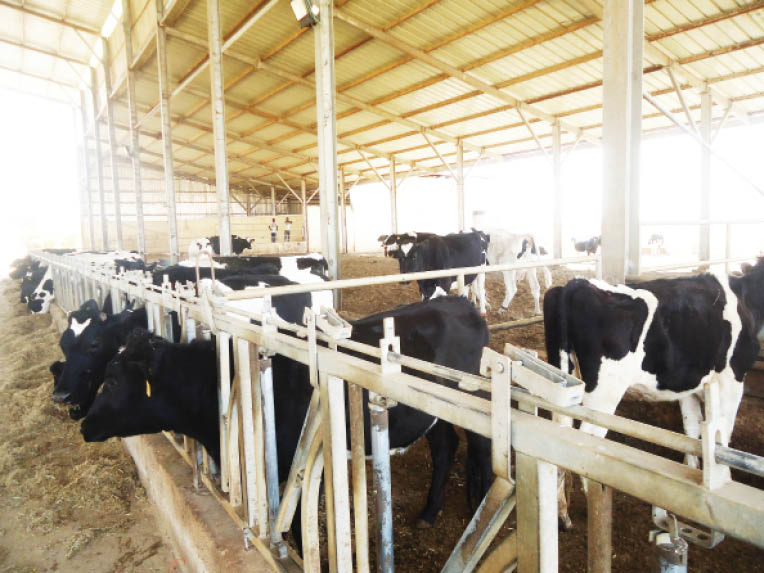How genetic improvement of local cows can address livestock crises
The main problem affecting the livestock subsector in the country is lack of investment into the genetic improvement of local cow breeds, many veterinary experts and farmers have said. The dairy industry is the most hit from deadly clashes between sedentary farmers and cattle herders who must roam around with the local cows for grazing. […]

Some of the good breeds of cows imported from South Africa in the Milky Way Dairy Farm in Bokkos, Plateau State
The main problem affecting the livestock subsector in the country is lack of investment into the genetic improvement of local cow breeds, many veterinary experts and farmers have said.
The dairy industry is the most hit from deadly clashes between sedentary farmers and cattle herders who must roam around with the local cows for grazing.
The output of these local cows in terms of productivity is often very low compared to how much an improved breed will yield both in meat and milk.
The average cost of a local cow ranges between N100,000 and N120,000 whereas an improved breed will fetch between N350,000 and N400,000 as contained in the designed Livestock Transformation Plan.
In terms of milk, an average Nigerian cow fetches less than 4 litres a day but an improved breed could give 15 litres and above.
Professor Bello Mohammed Aegie, president of Nigeria Veterinary Medical Association (NVMA), speaking with Daily Trust in Abuja, said government must look into the genetic improvement of local breeds in order to scale up to modern dairy farming,
The professor believes doing so will gradually phase out the traditional system and give way for modern farming which is more profitable to the farmers.
He believes this will also solve the many problems created by incessant conflicts between farmers and herders.
At a recent press conference organised by the NVMA, Professor Bello, along with other professionals, said government needs to seriously intervene in the genetic improvement of local cows by setting up the necessary structures to achieve this goal, which will eventually make way for modern farming and also put an end to the killings.
An animal production expert, Mr. David Ayuba, said it will cost government more if it ignores the dairy industry because it will spend more trying to keep the peace between the crop farmers and herders, adding that the country must have spent billions already in the last few years over the conflict.
If such amount is put into breed improvement research and development, even the traditional herders will gradually accept the modern ranching systems once they see how productive and profitable it is.
“Whether we like it or not, the current nomadic system has no place in the future” and “the only way to transit into the future is genetic improvements that yield better results and avoids the current bloody trends,” he said.
Dr. Andrew Kwasari, Advisor, Agriculture Interventions Coordination, Office of the Vice President, said the new livestock development plan will be addressed but that not much will happen if there is no commitment to breeding research.
A herder, Bello Mua’zu, told this reporter that if he gets a good breed that is more productive, he will be happy to accept the ranching system as he has so far lost his younger brother and a number of cows to the conflict, adding that “the cows are even shrinking by the day.”
The Minister of Agriculture and Rural Development, Chief Audu Ogbeh, while playing host to a delegation of private investors led by the Netherlands Ambassador to Nigeria, Ambassador Marion Kappeyne in Abuja last week, said the Nigerian government would require the support of Netherlands’ government in the areas of research and cattle breeding among others.
Meanwhile, although the minister has repeatedly talked about improving the local cattle breeds, nothing significant has been done in the last four years.
Even the much talked about Brazilian grass seeds, cattle colony and ranching have not seen the light of the day yet.
What is now in the offing is the National Livestock Transformation Plan chaired by the National Economic Council (NEC) headed by Vice President Yemi Osinbajo which stakeholders are watching to see if it will be any different.
